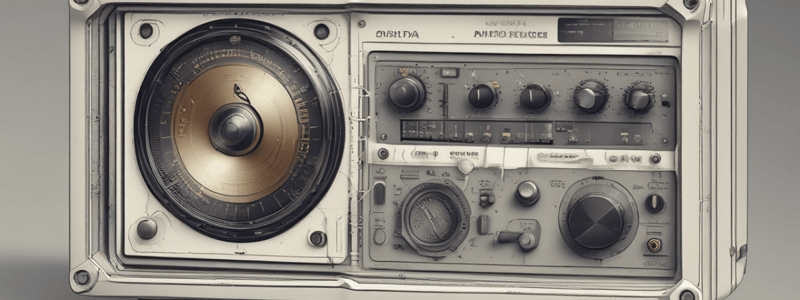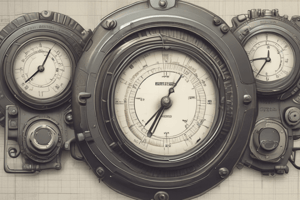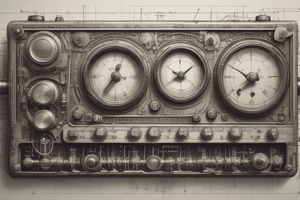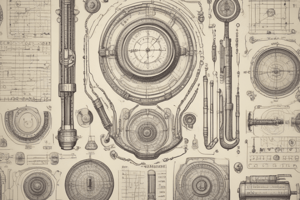Podcast
Questions and Answers
What can social media be when combined with other internet tools?
What can social media be when combined with other internet tools?
- A big boon (correct)
- A medium for cyber bullying
- A threat to society
- A huge problem
What is a benefit of having an online profile on LinkedIn?
What is a benefit of having an online profile on LinkedIn?
- To connect with victims of cyber bullying
- To blackmail others
- To spread misinformation
- To get in touch with amazing entrepreneurs (correct)
Flashcards are hidden until you start studying
Study Notes
Analog Instruments
- Analog instruments are devices that measure physical quantities, such as pressure, voltage, and current, and display the output in a continuous signal.
- These instruments are extensively used in various applications, including engineering, physics, and chemistry.
Classification of Analog Instruments
- Analog instruments can be classified into three types based on their function:
- Indicating instruments: These instruments measure the magnitude of a quantity and display the output using a dial and a pointer. Examples include voltmeters, ammeters, and wattmeters.
- Recording instruments: These instruments record the variations of a quantity over a specific period. Examples include recording voltmeters and oscilloscopes.
- Integrating instruments: These instruments totalize events over a specific period. Examples include ampere-hour meters and watt-hour meters.
Deflection, Controlling, and Damping Torques
- Deflection torque: The torque required to deflect the pointer of an instrument to a specific position. It is produced by the deflecting system.
- Controlling torque: The torque that opposes the deflection torque and brings the pointer back to its zero position. It is produced by the controlling system.
- Damping torque: The torque that reduces the oscillations of the pointer and helps it to settle quickly. It is produced by the damping system.
Effects Used to Produce Deflecting Torque
- Magnetic effect: Used in most ammeters, voltmeters, and wattmeters. It produces a deflecting torque by using a magnetic field.
- Electromagnetic induction effect: Used in voltmeters, ammeters, and energy meters. It produces a deflecting torque by using electromagnetic induction.
- Heating effect: Used in thermal instruments. It produces a deflecting torque by using the heat generated by the current.
- Chemical effect: Used in integrating instruments. It produces a deflecting torque by using a chemical reaction.
- Electrostatic effect: Used in electrostatic instruments. It produces a deflecting torque by using an electrostatic field.
Torque to Weight Ratio (T/W Ratio)
- The T/W ratio is an important factor in instrument design. It is the ratio of the deflecting torque to the frictional torque.
- A higher T/W ratio indicates a more sensitive instrument.
Analog Voltmeters and Ammeters
- Analog voltmeters measure voltage and display the output using a needle.
- Analog ammeters measure current and display the output using a needle.
- Both types of instruments use a moving coil or a moving iron to measure the quantity.
Comparison with Digital Instruments
- Analog instruments have some advantages over digital instruments, such as:
- Providing a better idea of the order of magnitude and trends.
- Not requiring a power supply beyond the test current source.
- However, digital instruments have generally superseded analog instruments due to their superior accuracy and precision.
Scale and Range
-
Analog instruments have a scale and range that is determined by the instrument's design.
-
The scale and range can be altered by providing a shunt coil or a multiplier.### Merits and Demerits
-
Merits refer to favorable circumstances, means, or opportunities that contribute to the success of a desired end.
-
Merits also describe the respectable qualities of a thing that make it worthy of respect and praise.
Demerits
- Demerits refer to the marks or characteristics of a thing that are deficient or misconduct.
- Demerits hamper the respect a thing has gained through its merits.
Difference between Merits and Demerits
- Merits are favorable to success, while demerits are unfavorable and have adverse effects.
- Merits refer to advantages or favorable significance, while demerits refer to unfavorable points.
Importance of Considering Merits and Demerits
- When evaluating a thing, it is essential to consider both merits and demerits to make an informed decision.
Examples of Merits and Demerits
Merits of Social Media
- Social media provides a wide social and mental platform for expression.
- It helps small businesses with marketing strategies.
- Social media is beneficial for educational purposes, especially during pandemic times.
- It can aid in job searches and provide opportunities to connect with entrepreneurs.
- Online profiles on LinkedIn help individuals connect with notable entrepreneurs.
Demerits of Social Media
- Oversharing on social media can lead to privacy problems.
- Cyberbullying is a significant disadvantage of social media.
- Social media platforms can spread misinformation.
- Blackmailing and releasing intimate videos on social media can harm reputations.
- Social media lacks the basic essence of mental and emotional connections between people.
- Not everyone is genuine on social media platforms, and it can be misleading.
Studying That Suits You
Use AI to generate personalized quizzes and flashcards to suit your learning preferences.





